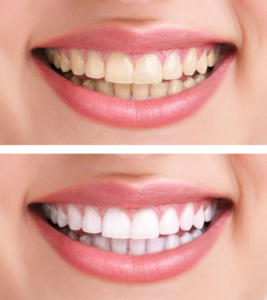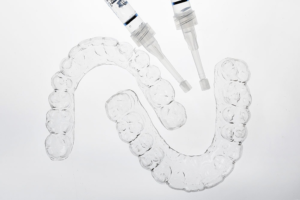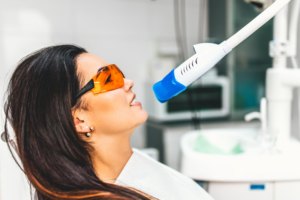Teeth whitening is a simple, non-invasive dental treatment used to change the color of natural tooth enamel and is an ideal way to enhance the beauty of your smile. Because having whiter teeth has now become the number one aesthetic concern of most patients, there are a number of ways to whiten teeth. The most popular 2 methods are home teeth whitening and office teeth whitening.

Reasons for teeth whitening:
Some staining and discoloration is natural as we age since we accumulate stains from foods and beverages and other elements over the years.
Tobacco Use
Cigarettes, cigars, pipes, and smokeless tobacco all stain teeth, especially after long-term repeated exposure. These stains can be minimized and often virtually eliminated by professional dental whitening. However, continued use after the whitening process will affect how long the whitening lasts.
Food and Beverages
Some foods, like colas, red wine, tea and coffee, also stain teeth, especially after long-term repeated exposure.
Medications
In some cases, medication can cause stains or tooth darkening. These stains can be some of the most stubborn and difficult to remove. Fluorosis, a condition caused by too much fluoride, can cause discoloration, as can tetracycline and some antibiotics used during childhood years.
We will thoroughly examine your teeth to determine if you are a good candidate for whitening, and what is the best method for your needs. A dental cleaning is always a good idea to make sure that the whitening gel can easily contact the clean, prepared surfaces of your teeth. We will also repair any damaged or sensitive teeth and address any cavity or gum problems before proceeding with the whitening procedure.
Home teeth whitening:

This type of teeth whitening usually requires two visits. At the first appointment, impressions (molds) will be made of your teeth to fabricate custom, clear, plastic, trays.
At your second appointment, you will try on the trays for proper fit, and adjustments will be made if necessary. The trays are worn with special whitening solution once a day for 15-30 minutes or overnight for a couple of weeks depending on the degree of staining and desired level of whitening. It is normal to experience tooth sensitivity during the time you are whitening your teeth, but it will subside shortly after you have stopped bleaching.
You will receive care instructions for your teeth and trays, and be encouraged to visit your dentist regularly to help maintain a beautiful, healthy, white smile.
Office teeth whitening:

A pearly-white smile is beautiful to look at and can greatly improve self-confidence. Many people are opting for the office teeth whitening for fast, safe and effective teeth whitening. Treatments are performed by an experienced professional. It is important to seek advice from the dentist prior to beginning a bleaching regime.
Prior to treatment, there will be a consultation where the dentist will outline the exact procedure. On treatment day, a deep cleaning (prophylaxis) will be performed to rid the teeth of any debris and plaque. Then, special eyewear will be provided to protect the eyes from the halide light, and splashguards to protect the clothing from the bleaching agent. After treatment you will receive care instructions for your teeth.
Whitening produces results in over ninety percent of patients, and it doesn’t hurt teeth. Typical results can produce a change of several shades of whiteness, lasting three to five years. Different factors affect how long the process takes, what method is used and how long the whitening lasts. A touch-up may be needed every several years, and more often if you smoke, drink coffee, tea, or wine.

